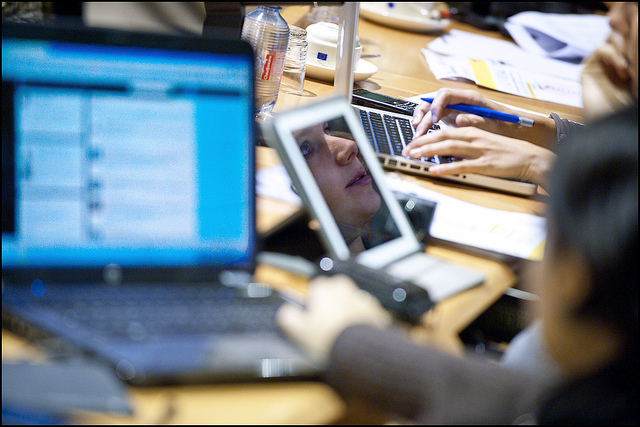
Reframe It engages TechCrunch to help develop Deliberative Polling for media
Photo credit: Flickr user European Parliament
Gregory Ferenstein is a writer for TechCrunch and founder of CrunchGov. Below, he writes about a new Knight Foundation grant to Reframe It, a San Francisco-based tech company, that will support new polling work for use by the media. The results of the work will be released publicly.
We’re excited to partner with Reframe It to test a research model they have developed. Reframe It is using a $165,000 grant from Knight Foundation to partner with TechCrunch and the Center for Greater Good to adapt a technique called “Deliberative Polling” for use by media organizations.
The polling technique educates a randomly selected group of citizens in an attempt to understand what they would think about an issue if they were truly informed about it. We’re glad to have the godfather of Deliberative Polling, Stanford University’s James Fishkin, assist with this work. In fact, Reframe It was co-founded by his son, Bobby Fishkin. They will conduct several Deliberative Polls related to technology policy issues, including immigration reform and the National Security Agency. We’ll lead the journalism work on the project because of our long history of reporting on tech issues. Over the next few months, we will publish stories about the process of Deliberative Polling and hope to release the first results by late fall. Additionally, with Knight funding Reframe It will create a report on the findings and share how journalists can apply these methods in different contexts.
Knight Foundation’s support will allow citizens to take the time to learn about issues from an expert panel and to deliberate with their peers. Reframe It will work with us and the Center for Greater Good to form that panel and a working group of U.S.-based TechCrunch readers.
Deliberative Polls have a few key advantages.
First, most Americans are disturbingly ignorant of policy issues. Two-thirds can’t name a single Supreme Court justice; only 37 percent of young Americans can find Iraq on a map; a third believe President Obama is a Muslim; and, as of 1999, 20 percent still thought the Sun revolved around the Earth.
Despite such ignorance, Americans will answer questions related to things they know nothing about. Last year, 39 percent had an opinion about a completely imaginary budget plan.
Polls are important, however, because we can’t just follow the beliefs of expert insiders. Deliberative Polls give us the advantage of inclusiveness by educating a randomly selected group of ordinary citizens. Second, Deliberative Polls show how education shifts popular belief. That is, in an informed America, some policies aren’t likely to have popular support.
As a media organization, TechCrunch finds this benefit most valuable. Ordinary citizens could be effective spokespeople for certain policies, especially if they changed their minds. Imagine a die-hard Tea Partier who becomes supportive of Obamacare after a deliberation (or a peacenik who becomes supportive of Syrian military intervention).
These citizens would make fantastic interview subjects or columnists.
We’re excited to work with Reframe It and the Center for Greater Good so that we can all give more voice to informed minds. We’re still determining many details, so expect more from us soon.
Recent Content
-
Journalismarticle ·
-
Journalismarticle ·
-
Journalismarticle ·


